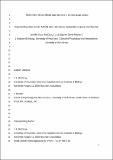Representing other minds : mental state reference is moderated by group membership
Abstract
The ability to infer the psychological forces that drive others' behaviour is a cornerstone of human cognition. This ‘theory of mind’ (ToM) we have has been extensively studied in its developmental stages and non-human forms. However, how the fully developed theory of mind functions on a daily basis is still the focus of ongoing research. One capacity stemming from theory of mind involves overt linguistic mental state reference. We propose that, rather than being a capacity that those with a fully developed ToM use consistently, mental state reference is a function of our social relationship to others: specifically, whether the other is perceived as an in-group or out-group member. We therefore examined spontaneous mental state reference during casual conversation as a function of group membership. Participants were divided into ‘in-group’ or ‘out-group’ pairs using a classic minimal group paradigm. Next, they were allowed to converse casually with their partner without the experimenter present and then subsequently asked to describe their partner in a written format after interactions. We scored participants' conversations and their written descriptions of each other for frequency and complexity of mental state reference. Results showed that, when interacting with presumed out-group members, participants referenced their partners' mental states significantly less often than when interacting with presumed in-group members. This effect was found both during conversations and in subsequent descriptions of the partner. Spontaneous mental state reference is apparently not a consistent psychological process but instead subject to social constructs, specifically group membership.
Citation
McClung , J S & Reicher , S D 2018 , ' Representing other minds : mental state reference is moderated by group membership ' , Journal of Experimental Social Psychology , vol. 76 , pp. 385-392 . https://doi.org/10.1016/j.jesp.2017.11.013
Publication
Journal of Experimental Social Psychology
Status
Peer reviewed
ISSN
0022-1031Type
Journal article
Description
This work was supported by a departmental stipend to the first author from the University of St Andrews, St Andrews, UK.Collections
Items in the St Andrews Research Repository are protected by copyright, with all rights reserved, unless otherwise indicated.

